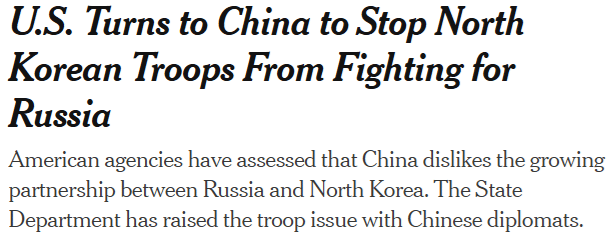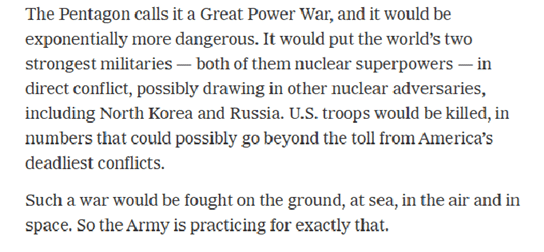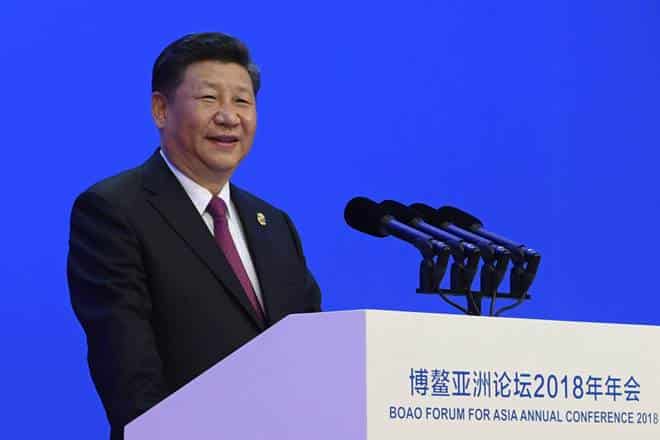Should China Join US Allies to Fight ISIS?
作者:Lang Yaoyuan 来源:US-China Perception Monitor
By Lang Yaoyuan
Since September, the US has shifted its diplomacy machine to high gears against ISIS. Cooperation in anti-terrorism may become an opportunity for China and the US to build a new-type major country relationship. Recently, US President Obama has gained majority domestic support to establish an international alliance, composed of more than 40 countries, determined to eradicate ISIS, the most savage terrorist group in the contemporary world. In China’s blogosphere, most netizens have expressed strong outrage against ISIS’s anti-humanitarian crimes and vowed to support the US in its efforts against ISIS. However, there are also a few individuals who bear schadenfreude, holding the opinion that “our enemy’s enemy is our friend”. We Chinese should have a sense of justice and should not tramp on human conscience out of a difference in ideology and cold-war mentality. The extremist ISIS elements should be regarded as common enemies of humankind.
ISIS members sent chills down the spines of the American public by cruelly beheading an American journalist in front of TV cameras. Today they announced to have beheaded a British hostage who had engaged in humanitarian aid. Members of ISIS have committed uncountable crimes, not only killing American and British hostages, but also killing non-Muslims and abusing women and children. They equal killing to charisma. They not only vow to attack the US and Russia but also threaten to expand their retaliation to countries and regions including China, India, Pakistan, the Philippines, and Tunisia. The Phoenix Weekly, in a recent cover story, quoted al-Baghdadi, leader of ISIS, as saying that “Muslims have been deprived of their rights. Look at Central Africa and Burma, they are just the tip of the iceberg of their plights. Allah, we will have revenge!” If justice does not overpower savagery, savagery will only become rampant. In the eyes of American officials, fighting ISIS should be a new overlapping interest point between the US and China. When the US President’s National Security Advisor Susan Rice, on her trip to Beijing, filled with hope, requested China to assist Obama and the alliance in fighting ISIS, China only responded with “we are interested” rather than making any commitment. I think that such lukewarm gesture reflects the lacking in sense of moral and diplomatic charisma, which a responsible major power should possess. The new diplomatic strategy endorsed by President Xi Jinping advocates a “community of common destiny” – a new type of major country relationship based on equality, mutual trust, mutual respect and win-win principles, breaking the historical vicious cycle where a rising power and an established power must confront each other. In the words of President Xi, it is “non-conflict, non-confrontation, mutual respect, and win-win”. Sincere embrace of the new rules of international relations will lead to positive-sum game and win-win will lead to the discarding of cold-war mentality and zero-sum game. Facing the world’s common enemy, terrorist group ISIS, if China adopts an onlooker position and inactive policy, or even feeling schadenfreude for the US, how can President Xi’s new diplomatic strategy be justified? How can China revert the negative perception of “selfish, indifferent, and irresponsible ” in the West? The US-led alliance against ISIS is a road-show test for the prospect of China-US building a new type of major country relations. The Chinese government should adopt a policy of “high-profile support and moderate participation”, voicing support and taking action.
First, high-profile support is needed. Whether or not China decides to send troops to join the alliance, it should voice its support to the US in a high-profile way, for the following three considerations.
Firstly, for national security. Supporting the US alliance to eradicate ISIS is in line with China’s national security and conducive for the formation of a united China-US anti-terrorist front. ISIS’s covet of China’s Xinjiang poses a threat to Chinese national security. Leave ISIS to grow and expand, there will be unthinkable consequences. The blood-hungry ISIS will not have mercy on China. If Xinjiang separatist forces inside China gang up with ISIS, that will have even more severe consequences.
Secondly for international image. China should make its anti-terrorist position and determination clear to the US and to the world. This would help China build an upright and responsible image in the international community and enhance China’s leadership and international reputation.
Thirdly for China-US mutual trust. Helping the Obama administration to get rid of ISIS will negate Obama’s comment about China being a free-rider. Out of moral concerns, the US will no longer create stumbling blocks for China in China’s neighboring regions. A new-type major country relationship between China and the US depends on both sides being broad-minded. Don’t let myopia and misperception block your own vision.
Diplomacy is not only the play of power, but also the art of balance and the wisdom of trade-off. In China’s peaceful rise, China-US relations are the most important bilateral relations. President Xi has emphasized the application of Chinese wisdom to dissolve the Thucydides trap. Confrontation between a rising power and an established power results from misconceptions of the international situation. To build a new type of major country relations, both sides need to understand that today’s international environment is completely different from that of the past. To avoid the historical trap of confrontation among major powers, we must build a new type of security system based on mutual security and get out of the security dilemma.
Because of domestic political pressures, lack of political capital, and its past failure in Iraq, the US is only able to combat ISIS in a limited capacity. As such, Washington will require greater cooperation from other powers. As the most important bilateral relationship in today’s world, the relationship between the United States and China needs greater stability and cooperation. Combating ISIS together provides such an opportunity. China should seize every chance to cultivate trust between the two nations, and endeavor to avoid suspicion and hostility between itself and the United States. This means neither bowing nor scraping in deference. On its rise to power, not only does China need to learn how to stand eye to eye with the United States; it needs to learn how to walk hand in hand. China not only needs the courage to compete with the superpower that is the United States, but it also needs to develop a sophisticated acumen to cooperate as well. For the US, a lack of cooperation between the two nations may be nothing but an inconvenience, but for China, a lack of cooperation will prove extremely troublesome.
Secondly, moderate participation is required. Through moderate participation, China offers high-profile cooperation in fighting ISIS. This will not necessarily mean that China will put boots on the ground in Iraq, nor will it mean that China approves of the US’s Iraq policy. While participating, China should keep in mind three primary goals for which it will assist the effort against ISIS.
The first goal for China in cooperating against ISIS is to boost China’s global image and support and enhance its role as a world leader. Though China may support the US in leading the fight against ISIS, it will not necessarily mean that China approves of US policies in Iraq. It must be made clear that the US is solely responsible for the current turmoil in Iraq, and that it should not seize the chance to throw the burden of Iraq to the UN or drag other countries into the chaos.
The second goal for China should be to not send it’s military to join in US air strikes, but instead offer support to the United Nations Security Council in logistics, coordination, and intelligence. Once the conflict has died down, China can contribute immensely to reconstruction efforts. Furthermore, the fight against ISIS will provide invaluable experience to the Chinese military, giving it training to protect the interests of protecting Chinese interests in foreign countries.
The third goal is distinction between anti-terrorist war and subversion. China should support the US in air strike against ISIS, but it should not allow the United States to escalate the anti-terrorist operation to the point where the United States seeks to attack and subvert the Assad regime.
There is no lack of precedent for China sending troops abroad. In recent years, China has sent warships to the Gulf of Aden as well as Somalia to carry out escort missions and protect vessels from pirates. Last year, the Chinese military sent troops to participate in the peacekeeping operation for the first time , making the endeavor an excellent contribution in peace keeping and regional stability. Furthermore, China can prove itself as a responsible country in fulfilling international obligations. With the aim of dedication to peace and a just cause, the Chinese army has made a great contribution in improving China’s image in the world stage.
Chinese diplomacy should have deep strategic insights in regards to international incidents, as well as long-term strategic goals for an overall approach to foreign affairs. Such goals should not only be appropriate for the courage and insight of a great power, but also demonstrate the will and tenacity of a great power. Therefore, in response to the United States invitation to form a group to fight ISIS, China should not shy away with an indifferent attitude or even pursue a policy of supposed moderation. It would be a huge diplomatic mistake if China loses this chance to prove itself.
In one of his recent articles, Henry Kissinger wrote that “In a sense, a new world order is being formed, in which the key is the relationship between China and the United States. Neither China nor the United States is capable of solving problems by itself. Cooperation is the only way to succeed. It is not easy for China and the United States to cooperate because of the two countries’ differences in history and in the way of doing things. Based on my understanding of Chinese government and Chinese people, I believe that the reform that China is currently undergoing, in combination with the change that has been brought to the U.S. by reality, has established a basis for dialogue and cooperation between the two countries. I’m deeply convinced that the two great powers can work hand in hand in the new world order.”
Lang Yaoyuan is an independent commentator and a marketing expert in China.
Translated from Chinese by Edward and Elizabeth. The original article is here:
http://www.chinaelections.com/article/1944/233279.html
来源时间:2018/4/5 发布时间:2014/9/26
旧文章ID:15801







